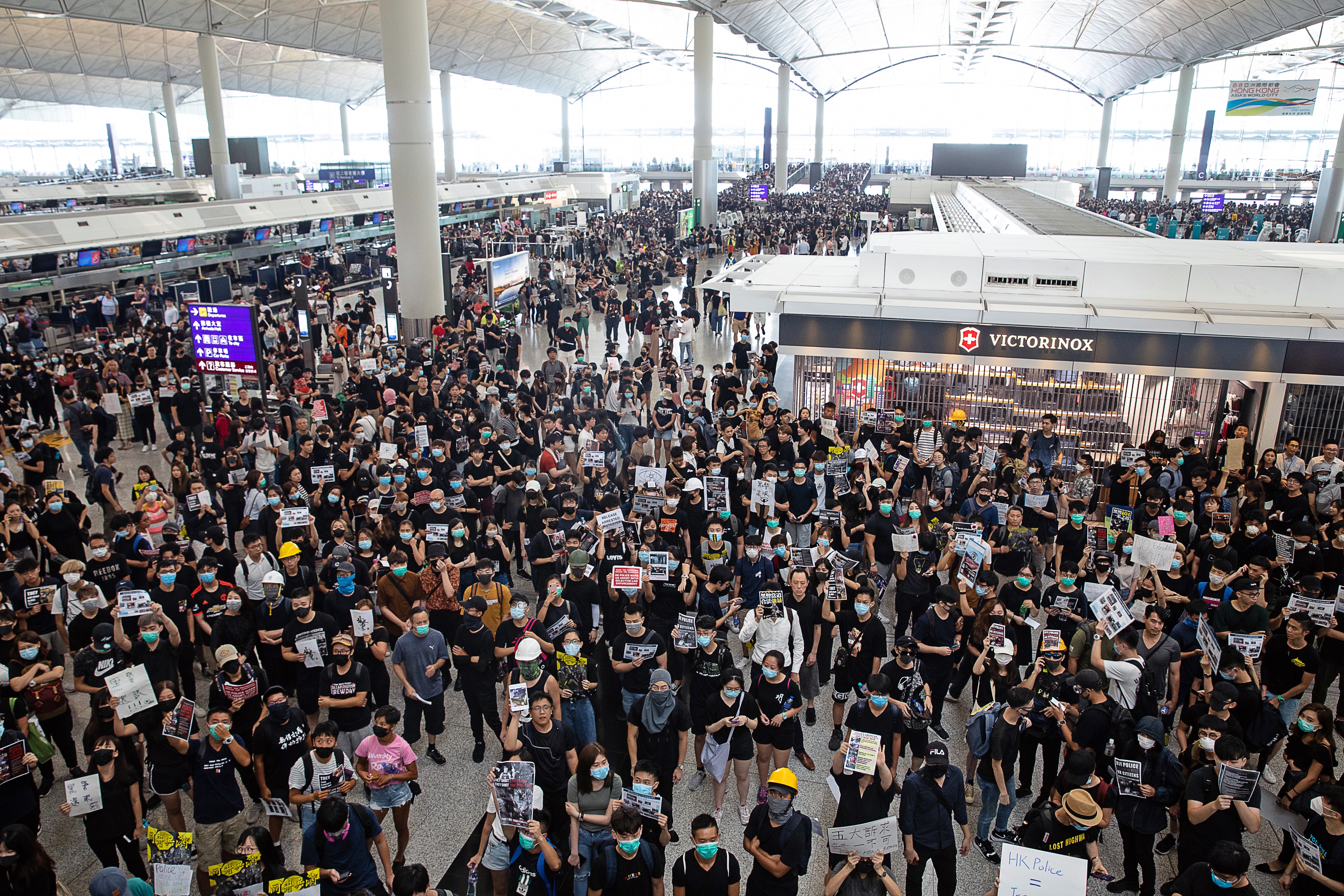Aug 14, 2019
Hong Kong airport beating shows protesters' fears running wild
, Bloomberg News
Hong Kong Airport Obtains Interim Injunction to Bar Protesters
The beatings of two men during a tense rally at Hong Kong’s airport highlights protesters’ growing fear of mainland intervention, as well as the risk that demonstrators’ violent tactics could undermine support for their movement.
An otherwise peaceful sit-in at Hong Kong International Airport on Tuesday turned ugly when protesters attacked and detained a man they suspected of being a security agent from the nearby mainland city of Shenzhen posing as a demonstrator. Such a deployment, if true, could represent a violation of the charter that guaranteed Hong Kong’s autonomous criminal justice system before its return to Chinese rule in 1997.
For hours, the attackers ignored pleas from fellow demonstrators and reporters to let the man be taken for medical attention -- ostensibly so they could prove his identity -- and put a sign on his chest saying “I am China’s police.” The group subsequently restrained and struck a man later identified as a reporter for the Global Times, a newspaper published by China’s Communist Party, forcibly tying him to a luggage cart.
The episodes -- broadcast on live television from one of Asia’s busiest airports -- illustrated protesters’ increasing use of violence after weeks of facing off against tear gas, rubber bullets and undercover officers sent into rallies. The police tactics have been repeatedly endorsed by the Chinese government and state-run media like the Global Times, whose editor-in-chief warned Monday that the chances of intervention were rising while commenting on a video of paramilitary forces assembling in Shenzhen.
China’s Hong Kong and Macau Affairs Office issued a statement Wednesday saying protesters at the airport “acted like terrorists” and it would support any local government effort to punish those responsible. Hong Kong police subsequently said the crimes were serious, but didn’t amount to terrorism.
The incidents also drew criticism among the opposition: Calls for a code of conduct for front-line protesters, including no beating medical personnel or journalists, circulated on popular social media forums.
The Foreign Correspondents’ Club in Hong Kong issued a statement expressing “grave concern” about the beating of the Global Times reporter and urged restraint from protesters. “Attacks on members of the media doing their job are unacceptable, regardless of the allegiance or views of the perpetrators,” the club said.
‘Very Paranoid’
Opposition lawmaker Fernando Cheung, who helped negotiate the journalist’s release, said the detentions were “totally not acceptable,” though he blamed police tactics for undermining public trust in the government.
“It’s extremely unfortunate that protesters have resorted to such behavior, because the whole campaign, the whole movement was about protecting our safety and liberty in Hong Kong,” Cheung said Wednesday. “The situation has become so chaotic, with the deployment of decoys, that people are very paranoid. And it’s come to a point where the whole situation could be ignited, with more confrontations and possibly more casualties.”

The South China Morning Post newspaper reported last month, citing an unnamed government adviser, that the central government’s strategy was to pressure protesters into revealing their intentions and “lure the snake from its hole.”
While the airport was quiet Wednesday night, police fired tear gas at protesters in Sham Shui Po district, the site of previous scuffles. A group that gathered to burn incense and sacrificial gifts on the road for what is known as the Hungry Ghost festival attempted to hand the gifts to police, sparking a brief standoff.
This week’s airport chaos followed an unverified report last week that Chinese authorities, rather than deploying the military, had secretly sent mainland security officers to supplement Hong Kong’s roughly 30,000-member police force. The Hong Kong police issued a statement Aug. 8 denying the claim as “just another wild rumor to confuse the public and generate conflicts in the society.”
While Hong Kong is part of China, its Basic Law tightly restricts mainland government agencies from interfering in local affairs, one of several provisions credited with preserving the city’s status as global financial center. Anxiety over the erosion of such legal firewalls has been at the center of the protests, since more than a million people took to the streets in June to oppose a now-suspended bill allowing the transfer of criminal suspects to the mainland.
“There are strict provisions that departments of the Chinese government cannot interfere in Hong Kong affairs,” said Danny Gittings, author of “Introduction to the Hong Kong Basic Law.” “So, if somebody is concurrently an officer in a mainland organization -- in other words, is serving in a mainland police force -- and is seconded to Hong Kong law enforcement agencies, there might be an argument that that constitutes such interference.”
At the airport Wednesday, protesters displayed what they said were mainland identity cards and two wooden sticks found on the first beaten man. They cited a Shenzhen Municipal Public Security Bureau website mentioning the same name to justify their suspicions. Hong Kong police on Wednesday confirmed the man was from the mainland but provided no other details on his identity.
Afterward, they similarly posted photos of an “I Love HK Police” T-shirt they said was taken from the Global Times journalist’s bag after he attempted to film their scuffles with the first man. The paper’s chief editor, Hu Xijin, confirmed in a tweet that the man was one of his reporters and said “he has no other task except for reporting.”
--With assistance from Sebastian Chau, Fion Li, Natalie Lung and Jinshan Hong.








